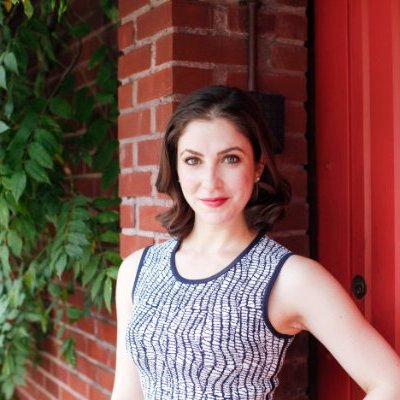Julie Schechter is the founder of the boutique fitness studio, FitBallet. I took a class yesterday morning and let me tell you, it works! It’s a fun workout that gets people results. Prior to founding FitBallet, Julie studied at Harvard Law and was an associate a law firm. Learn how she followed her passion and created a career that she loves.

What inspired you to start FitBallet?
It was kind of a two-part journey. I first started working on the curriculum when I was in my first year of law school. I’d gone from moving 5 or 6 hours a day as an undergraduate dance major to studying (and therefore sitting) almost 12 hours a day as a law student. I could sneak away for an hour at the gym, but multiple hours of dance classes were out of the question. I tried other forms of fitness—Crossfit, barre, yoga—but none of them could help me keep the dancer body I’d relied on and loved. I wanted strength and cardiovascular endurance, but without “bulk.” So, I developed a curriculum that combined ballet exercises with circuit training. I loved it, and when I asked my friends (dancers and non) to try it out, they loved it, too.
The second half of the story was sparked by how much they loved it. One friend (a fellow former ballerina) who had suffered from post-partum depression told me that after two months of FitBallet training, she could pick up all three of her children at once. She said she felt truly powerful for the first time, and that she was proud of her body because of what it could do instead of what it looked like. Her words lit a fire under me.
I should have been happy with my career up until that point. I’d gone to Harvard Law School. I was working at a top-tier law firm. But I wasn’t. I felt like I was headed down a completely bizarre track that had nothing to do with who I was as a human. And then I had that conversation, and went, “Of course! This is right.” I took a few months to process and plan, and then I left the law firm to start FitBallet.
How would you explain FitBallet’s program and philosophy in a few sentences?
Our philosophy is this: the national conversation about female fitness completely misses the point. We talk about working out as though the objective is to outrun all the calories you’ve recently consumed. To get “skinny,” like it’s this Holy Grail of human achievement. What we should be talking about is what your body can do, and how it makes you feel. Can you run across a beach, carry a baby for miles, dance for hours at a wedding? Could you get your family out of the house in a fire? Women are powerful; the furtherance of our species depends on most of us undergoing a huge physical trauma. So we’re not going to let the conversation about our bodies revolve around “I just really want to lose three pounds.”
You’ve danced for your entire life. What made you fall in love with ballet?
First: it’s beautiful. A performance is so dramatic: the lights, the orchestra, and the unbelievable feats that happen onstage. But there’s something transcendent about class, too: gripping the wood barre, working through the piano music, sinking into that first plié. It’s a body-soul connection that’s unmatched in other physical disciplines.
And you’re always compelled onward. There’s always more you can do, further you can push yourself. Even professional dancers, for whom ballet is their life, can feel they have massive room for improvement. That feeling can become warped, if you internalize it as a sense of never being good enough. But if you look at it as a journey, as a discipline that’s never going to put a ceiling on how high you can go, it becomes exciting instead.
What advice do you have for someone who wants to start her own business?
Be sure that the area you choose is something for which you have a live-or-die level of passion. So much of running a business is doing all the other things you never think about: taxes, payroll, marketing. You have to love your core subject enough that you’re willing to slog through the boring parts to get to work on the aspects you love.
What is a typical day like for you? Please walk me though a day!
I usually get up around 6 or 6:30 am and head to a workout class. I have to get it in first thing, or else the rest of the day will just conspire to ensure it never happens. If we have a morning class that day, I’ll go to that. It’s very surreal to have other instructors leading my classes; we’ll get halfway through a set of walking push-ups, and I’ll be like, “Who’s the jerk that made this up?” But all the instructors are fantastic, and it’s always such a rush to go take class with them. I leave all pumped up about the future of this business.
I go home, shower, and head back out to a coffee shop to spend the first part of the day catching up on emails. I have to get out of the house to work, or else I get totally claustrophobic. I do social media for FitBallet and follow up on any partnerships or marketing efforts we have going. Some mornings, I have personal training clients. Those are always the best days, because we quickly become friends, and it feels more like going to hang out with a buddy for an hour, rather than heading off to “work.”
Afternoons are all about strategy, because that’s when I’m most awake and focused. I try to think as big-picture as possible once a week (usually over brunch on Sunday, when coffee makes everything seem possible) and make myself an enormous, semi-impossible list of goals. And then afternoons throughout the week are spent breaking down that list: Who should I talk to so that I can get into that magazine? What’s the best way to help young mothers exercise more? I feel like there’s an unending list of ways I want to spread this message of strength, and I’m just chugging through it.
I usually try to turn off my brain (and my laptop) around 8 pm.
What are some of the best things, and on the flip side the most challenging things, about starting your own business?
I’d say the most challenging thing is what I just mentioned: not being able to stop thinking about the business. When it’s all on you, there’s always more you could be doing, one more email you could send. You have to learn that everything will still be there tomorrow, but you won’t, if you don’t regulate yourself. The best thing is sort of the flip-side of the worst thing: your success is completely determined by how hard you’re willing to work. When you love what you’re doing, that feels like a gift. No one’s putting a cap on how high you can go.
What are some of your responsibilities as CEO and founder of fitBallet?
I manage a team of (fabulous) instructors, teach classes myself and do personal training. I also run the back-end of things: payroll, taxes, booking studio space and coordinating our relationships with organizations like ClassPass and FitReserve. I do all the social media and marketing. We’ll also be opening our own studio space later this year, so I’m looking for leases and coordinating all the planning involved in that adventure. It’s a lot, but I love it.
You went to Harvard Law and practiced as an attorney for a few years before leaving to work on FitBallet full time. How did you get the courage to leave a corporate job to pursue your passion?
I’m lucky enough to have a fantastic support network. My friends and my parents could all see that I was trading in the wrong fit for the right one, and they pushed me to be brave enough to admit that and just go for it. I think it helped that I wasn’t that focused on money. Of course, I would love to be financially successful (I think we all would). But when I sat down and made a literal pro/con list (did I care more about sushi lunches or being excited about getting up in the morning?) the decision was pretty clear. I think we’re all braver than we give ourselves credit for. We hear about someone doing something courageous, and we think, “Oh, I could never do that!” But what if someone walked into your boss’s office and quit on your behalf, and there was no going back? You’d land on your feet, wouldn’t you? Of course you would. You’d figure it out as you went.
What advice do you have for other people who hope to make a big career change?
Give yourself a set period of time to make the decision (whether it’s one month or three) and metrics by which you’ll make the choice. Are you waiting to save up a certain amount of money? Ok, what is it, how long will you need, and what are you going to cut out of your budget to get there? I think often we sort of drift along and hope life makes decisions for us. Sometimes that happens—you get fired, say—but most of the time it doesn’t. Giving myself a framework to make decisions within is the only way I ever get anything done.
What is one thing that you wish you had known when you were starting out your career?
I wish I would have known to view my business as an entity totally separate from myself. If you feel strange promoting yourself—and I think most women do—it can feel uncomfortable to do the level of promotion that’s necessary to get a new venture off the ground. You have to be incredibly persistent and get rid of the idea that people will come to you, if your product/service is good enough. People don’t know about your business, and even if they do, you have to explain why what you’re offering is fantastic. When I learned to divide myself from FitBallet, it was a lot easier to tell that story.
What advice would you give to someone who is in the first five years of her career?
Work incredibly hard, but still set boundaries. Every industry tends to view itself as crucial (and they mostly all are, in different ways) but unless you’re an EMT or one of the joint chiefs, no one needs to be able to get ahold of you late on a Friday night or early on a Sunday. People will respect you for respecting yourself. Make it clear that you’ll show up Monday through Friday (or whenever your official hours are) ready to work like an animal…and that, when Saturday rolls around, you are not available. Your personal life is just as worthy of your attention as your professional life.
How would you define your professional style? What are a few staples?
Well, right now I’m spending an awful lot of time in yoga pants! A fitness career doesn’t exactly lend itself to a lot of dressing up. But when I have meetings, I’m a black blazer and dress girl. And heels, of course. I never feel totally myself in flats, which leads to a lot of awkward situations in New York (like the day I broke my heel completely off by tripping over a cobblestone as I walked into my first day of work at my New York City law firm. Classic.)
What is on your desk right now?
My laptop (obviously), water, coffee, chapstick and a Pommes Frites candle in Teakwood and Tobacco (I am obsessed). My Moleskine notebook, too. I live and die by my to-do list, and I have to write it down. I know Google Calendar would be more efficient, but I just can’t get into it.
Where do you turn for inspiration?
I read fiction, or talk to my friends about their lives. I have to get completely out of the fitness world in order to find something intelligent to bring back into it. If I get too caught up in paying attention to what’s happening in similar businesses, I start thinking, “Oh, that’s great, maybe I should be doing that!” But the reason I started FitBallet was to bring something new to the table. I have to remember to keep looking outward to be able to solve problems in a helpful way.
Who is your mentor or role model?
My mother. She created a worldview in which all that stood between me and any goal I wanted to accomplish was work; I grew up pretty much sure that I could do anything I wanted, as long as I put in the sweat equity. She worked full-time most of my childhood, and still was an incredibly present parent and wife. Whenever I feel overwhelmed, I think, “Well, if she can do it…” and then…I just do it.
What is the best advice you’ve ever received?
My dad once told me: “No one else knows what they’re doing, either.” So many women—myself included—have this tendency to assume that everyone else has it all together, that we’re the only ones who are second-guessing ourselves. And it couldn’t be further from the truth. You learn specific skills over time, of course, but then life throws you into a completely different arena where those skills aren’t even applicable anymore. We’re all getting knocked down and crawling back to our feet over and over…but we only see our own stumbles.
What is a fun fact about you?
I love to write! I’m working on a novel in my spare time. (Which…doesn’t exist right now.)
What advice do you have for other young professional women?
Be kind to yourself, and to each other. It takes so little to lift someone else up—listening to the story of their terrible day, or telling them you like their skirt—and it means so much when you’re the recipient. I don’t believe in the “Mean Girls” thing at all. I refuse it. We’re all each other’s greatest source of strength.
What is your favorite quote?
“Everything you want is on the other side of fear.” –Jack Canfield
Julie just released an e-book with FitBallet workouts! She is graciously offering a 10% off coupon when you use the code, Elana. The e-book gives you a comprehensive guide to all of the moves, ten different workouts for three different experience levels, stretches, and a meal plan. You can also follow along with the videos on the YouTube Channel. I love my copy and can’t wait to get started!
Guess what? We’re also giving away one free e-book! Simply comment below to telling us your favorite quote from the interview. We’ll be randomly choosing a winner. Good luck!
































21 Responses to Career Profile: Julie Schechter, Founder of FitBallet